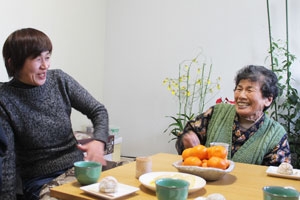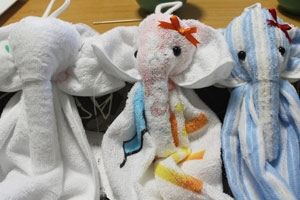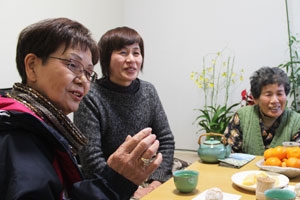Japan One Year: Diary 5
Finding hope in Fukushima
by Francis Markus in Yabuki Town
2012/02/21

Teru Yamada is in a cheerful mood when I visit her in her temporary house for the first time since last August.
The 78-year-old grandmother has been keeping herself busy by making little elephants out of towelling, under a project set up by a local non profit group. To the Japanese, the animals bear a connotation of “never giving up,” she explains.
“Making these things keeps me busy and makes me feel much better.”
(Photo: Mrs. Teru Yamada (right) and Mrs. Ayako Yamada.)

Ups and Downs
Mrs Yamada has had her ups and downs, it seems. In October, she and her daughter and grandson went on their second visit back to their home in the 20 km exclusion zone around the Fukushima Daiichi nuclear plant, from where they were evacuated to this temporary housing settlement.
“I felt very disappointed.” The grass had grown so long around the family home that it threaten to scratch her grandson’s car and the family were warned not to touch it because of radioactivity. “The herd of cows nearby was running wild and it was very sad to see them.”
(Photo: Little elephants Mrs. Yamada make out of towelling.)
Emotional Impact
The visit had such an emotional impact on Mrs. Yamada that “I fell ill with a cold which lasted for a month and I suffered from a skin rash.”
She says she will not go again, even if her grandson and daughter go in March.
We continue talking about the impact the nuclear disaster has had and how unprepared people were for it.
“I was ten years old when the Fukushima Daiichi plant was built, back in the 70’s when nuclear power was not all that widespread,” says her daughter.

Little about Safety
All that the young people were told about safety surrounding the plant was when “the teacher said if anything happens, we should go and stand in the playground and we would be given pink pills.”
After a while, despite Mrs Yamada’s initial cheerfulness, the emotional strain begins to show and she breaks down in tears.
Although the family’s basic needs are being met in the temporary housing, with for example a package of household electrical appliances provided by the Japanese Red Cross, she misses her life in her home village, near the doomed nuclear plant. She also misses her husband, who passed away a few months before the disaster. “I was born there and married someone from only 4 km away and spent my whole life there,” she says.
Her sadness, however, comes and goes. Her daughter is philosophical: “sometimes I tell myself that I must stop thinking of myself as a disaster survivor or victim.”
This carries the conversation back once again into more positive territory. Mrs Yamada looks forward to an event gathering together the makers of the towelling elephants.
Telling the World
The local social worker is keen that we should tell the international community about people’s situation in Fukushima. As well as sadness, people here also feel anger. We plan to come back with a video cameraman to interview Mrs. Yamada and her daughter.
They are happy to agree to be filmed and I feel glad that we’re going to see them again a third time. Although I’m sure it’s good for Mrs. Yamada to express her feelings of loss and grief, I still can’t help hoping that the elephants manage to keep her cheerful more of the time.
(Photo: Mrs. Sakaji, local social worker (left) and Family Yamada)















